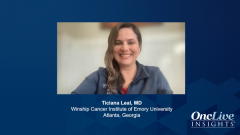
HERTHENA-Lung01: Patritumab Deruxtecan in Advanced EGFR-Mutated NSCLC
Experts on lung cancer review key data from the HERTHENA-Lung01 study investigating patritumab deruxtecan (HER3-DXd) in patients with advanced EGFR-mutated NSCLC.
Episodes in this series

This is a synopsis of an Insights series featuring Ticiana Leal, MD, of Winship Cancer Institute of Emory University, and Sandip P. Patel, MD, of UC San Diego Health Moores Cancer Center.
Associate Professor and Director of the Thoracic Medical Oncology Program at the Winship Cancer Institute of Emory University Ticiana Leal, MD and Professor of Medical Oncology at the University of California, San Diego Sandip P. Patel, MD discussed recent results from the phase 2 HERTHENA-Lung01 trial of the anti-HER3 antibody-drug conjugate (ADC) patritumab deruxtecan in epidermal growth factor receptor (EGFR) tyrosine kinase inhibitor (TKI) resistant non–small cell lung cancer (NSCLC).
Dr. Leal explained the study population included those with disease progression after osimertinib and platinum-based chemotherapy. Patients were heavily pretreated with over 50% having prior central nervous system (CNS) metastases and 30% with active stable CNS disease allowed. Treatment consisted of 5.6 mg/kg intravenous patritumab deruxtecan every 3 weeks. Impressively, the overall response rate was around 30% with CNS response rate comparable to systemic response. Activity was demonstrated across various resistance mechanisms. The safety profile was manageable with under 10% treatment discontinuation rate. Myelosuppression and transaminitis were the most common adverse events. Interstitial lung disease occurred in 5.3% but was mostly low grade.
Given these promising efficacy and safety data, a phase 3 trial is already accruing rapidly comparing patritumab deruxtecan to chemotherapy in EGFR TKI and platinum refractory populations. Combinations with osimertinib are also being explored for future directions.
Dr. Patel concurred ADC approaches combatting phenotypic HER3 upregulation hold great therapeutic potential requiring robust validation through well-designed randomized trials. Biomarker analysis to enrich for likely ADC responders is also integral to optimize clinical application.
*Video synopsis is AI-generated and reviewed by OncLive editorial staff.








































